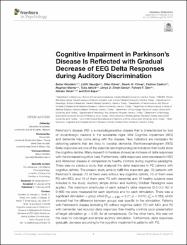| dc.contributor.author | Güntekin, Bahar | |
| dc.contributor.author | Hanoğlu, Lütfü | |
| dc.contributor.author | Güner, Dilan | |
| dc.contributor.author | Helvacı Yılmaz, Nesrin | |
| dc.contributor.author | Çadırcı, Fadime | |
| dc.contributor.author | Mantar, Nagihan | |
| dc.contributor.author | Aktürk, Tuba | |
| dc.contributor.author | Emek Savaş, Derya Durusu | |
| dc.contributor.author | Özer, Feriha | |
| dc.contributor.author | Yener, Görsev | |
| dc.contributor.author | Başar, Erol | |
| dc.date.accessioned | 10.07.201910:49:13 | |
| dc.date.accessioned | 2019-07-10T19:50:53Z | |
| dc.date.available | 10.07.201910:49:13 | |
| dc.date.available | 2019-07-10T19:50:53Z | |
| dc.date.issued | 2018 | en_US |
| dc.identifier.citation | Güntekin, B., Hanoğlu, L., Güner, D., Helvacı Yılmaz, N., Çadırcı, F., Mantar, N. ... Başar, E. (2018). Cognitive impairment in parkinson's disease is reflected with gradual decrease of eeg delta responses during auditory discrimination. Frontiers in Psychology, 9. https://dx.doi.org/10.3389/fpsyg.2018.00170 | en_US |
| dc.identifier.issn | 1664-1078 | |
| dc.identifier.uri | https://dx.doi.org/10.3389/fpsyg.2018.00170 | |
| dc.identifier.uri | https://hdl.handle.net/20.500.12511/2097 | |
| dc.description | WOS: 000425653300001 | en_US |
| dc.description | PubMed ID: 29515489 | en_US |
| dc.description.abstract | Parkinson's disease (PD) is a neurodegenerative disease that is characterized by loss of dopaminergic neurons in the substantia nigra. Mild Cognitive impairment (MCI) and dementia may come along with the disease. New indicators are necessary for detecting patients that are likely to develop dementia. Electroencephalogram (EEG) Delta responses are one of the essential electrophysiological indicators that could show the cognitive decline. Many research in literature showed an increase of delta responses with the increased cognitive load. Furthermore, delta responses were decreased in MCI and Alzheimer disease in comparison to healthy controls during cognitive paradigms. There was no previous study that analyzed the delta responses in PD patients with cognitive deficits. The present study aims to fulfill this important gap. 32 patients with Parkinson's disease (12 of them were without any cognitive deficits, 10 of them were PD with MCI, and 10 of them were PD with dementia) and 16 healthy subjects were included in the study. Auditory simple stimuli and Auditory Oddball Paradigms were applied. The maximum amplitudes of each subject's delta response (0.5-3.5 Hz) in 0-600 ms were measured for each electrode and for each stimulation. There was a significant stimulation x group effect [F(df = 6; 88 = 3,21; p < 0.015; eta(2)(p) = 0.180], which showed that the difference between groups was specific to the stimulation. Patients with Parkinson's disease (including PD without cognitive deficit, PD with MCI, and PD with dementia) had reduced delta responses than healthy controls upon presentation of target stimulation (p <0.05, for all comparisons). On the other hand, this was not the case for non-target and simple auditory stimulation. Furthermore, delta responses gradually decrease according to the cognitive impairment in patients with PD. Conclusion: The results of the present study showed that cognitive decline in PD could be represented with decreased event related delta responses during cognitive stimulations. Furthermore, the present study once more strengthens the hypothesis that decrease of delta oscillatory responses could be the candidate of a general electrophysiological indicator for cognitive impairment. | en_US |
| dc.description.sponsorship | Turkish National Science and Research Council TUBITAK [214S111] | en_US |
| dc.description.sponsorship | This study was funded by Turkish National Science and Research Council TUBITAK (Grant No. 214S111). | en_US |
| dc.language.iso | eng | en_US |
| dc.publisher | Frontiers Media Sa | en_US |
| dc.rights | info:eu-repo/semantics/openAccess | en_US |
| dc.rights | Attribution 4.0 International | * |
| dc.rights.uri | https://creativecommons.org/licenses/by/4.0/ | * |
| dc.subject | Parkinson's Disease | en_US |
| dc.subject | EEG | en_US |
| dc.subject | Event Related Oscillations | en_US |
| dc.subject | Delta | en_US |
| dc.subject | Oddball Paradigm | en_US |
| dc.title | Cognitive impairment in parkinson's disease is reflected with gradual decrease of eeg delta responses during auditory discrimination | en_US |
| dc.type | article | en_US |
| dc.relation.ispartof | Frontiers in Psychology | en_US |
| dc.department | İstanbul Medipol Üniversitesi, Uluslararası Tıp Fakültesi, Temel Tıp Bilimleri Bölümü, Biyofizik Ana Bilim Dalı | en_US |
| dc.department | İstanbul Medipol Üniversitesi, Rektörlük, Rejeneratif ve Restoratif Tıp Araştırmaları Merkezi (REMER) | en_US |
| dc.department | İstanbul Medipol Üniversitesi, Tıp Fakültesi, Dahili Tıp Bilimleri Bölümü, Nöroloji Ana Bilim Dalı | en_US |
| dc.department | İstanbul Medipol Üniversitesi, Sağlık Bilimleri Enstitüsü, Sinirbilim Ana Bilim Dalı | en_US |
| dc.authorid | 0000-0002-0860-0524 | en_US |
| dc.authorid | 0000-0003-4292-5717 | en_US |
| dc.authorid | 0000-0001-7566-1063 | en_US |
| dc.authorid | 0000-0002-0396-2040 | en_US |
| dc.authorid | 0000-0002-7555-3801 | en_US |
| dc.authorid | 0000-0002-0012-2708 | en_US |
| dc.identifier.volume | 9 | en_US |
| dc.relation.ec | info:eu-repo/grantAgreement/TUBITAK/SOBAG/214S111 | en_US |
| dc.relation.publicationcategory | Makale - Uluslararası Hakemli Dergi - Kurum Öğretim Elemanı | en_US |
| dc.identifier.doi | 10.3389/fpsyg.2018.00170 | en_US |
| dc.identifier.wosquality | Q2 | en_US |
| dc.identifier.scopusquality | Q1 | en_US |



















